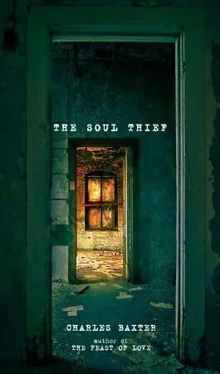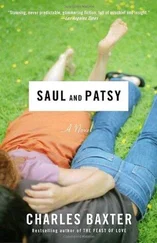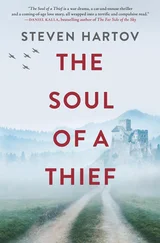“Coolberg. It was Coolberg, right? He found you.”
The burglar shrugs. “A man’s gotta eat.”
“Which you’re doing. For free. It’s not as if you’re dining off your ill-gotten gains.”
“That’s right. I gave the ill-gotten gains to Luceel. My wife. You remember her. You let yourself meet her, which she didn’t want to do, with you. She didn’t like your looks. She didn’t want to make your acquaintance. Listen, I tell you what.” Ben straightens up. His comic momentum appears to have diminished. “So here I am, okay, right? Eating?” He talks and chews with his mouth open, exposing his nutrition. “So. Okay. So look around at my kingdom.”
Nathaniel involuntarily takes in the People’s Kitchen. Its sights and smells — the graying dust on the front windows, the vinegary odor of cooked food and gamy dirty clothing, the collection of cast-off benches and chairs on which the four other shabby diners sit, absorbing what nourishment they can, the cars on Allen Street rumbling by in a gray audible haze — the entire scene, he knows, should depress him with its overtones of despondency, what his stepfather used to refer to, smilingly, as miserabilium. Gray day, grayer mood. But no: he feels comforted and slightly elated to be here among scruffy outcasts. These are his people.
“So what’s your point?” Nathaniel asks.
“My point? My point? Listen, there’s gotta be a word for people like you, people who get off being around people like me. I’m just trying not to go down the drain here, man. Maybe you haven’t noticed: my future ain’t what it used to be.”
He rubs at his chin. He is working himself up and shivers with agitation.
“You look at me. Okay, I got a habit. Also I got a pregnant wife, but we love each other, me and Luceel, and you come in here, asking me questions like I’m some award you got in the Good Deed Department. You sit there, college boy, pretending like I got a whole bunch of choices in life, a cookie jar full of cookies. You got a word for yourself, for what you are, you little shit, you slimeball educated fuck?” He says this quietly, with scary neutrality.
“A sentimentalist,” Nathaniel says. “But I thought we were talking about my stolen shirts.”
“Whatever.” Ben takes another bite of bread. Outside a siren passes. “So, on account of you once made me a cup of coffee, I’ll say this to you, at least: No, it wasn’t whoever you said it was, Iceberg or Coolberg or Kustard or whatever the fuck his name is or was, who asked me for a couple of your shirts and the other stuff. Hey, someone comes up to me, askin’ for help on a job, offering money, I don’t ask this jerkoff who they are and what they want this shit for. I just do it.”
“So who was it? Who was he?”
“Not a ‘he.’ It was a her. Your girlfriend.”
“Jamie? What would Jamie want with my clothes?”
“That’s funny. You’re funny. Jamie. I like that. Me, I do my women one at a time. Sorry to disappoint you. I never heard of this Jamie. Wasn’t her.”
“Theresa?”
“That’s the one.”
“How’d she find you?”
“Guess you must’ve told her about me.”
“Did she talk to you here?”
Ben shakes his head emphatically. “We’re finished, you and me. No more questions, and no more answers neither.” Ben takes his spoon and taps it twice on the soup bowl. “No, wait a minute, I just thought of something.” He turns to gaze through his film-noir eyeglasses at Nathaniel for a long moment, during which the sounding clatter of dishware comes out of the kitchen, and Ben takes a stagy cigarette from his shirt pocket, sticks it into his mouth, and lights it with a safety match. Outside on the street, a car hoots. “You know what? I’m better than you.” He inhales and nods, agreeing with himself. “Much better. I love my wife, is the thing. I don’t have to apologize about that to no one. Okay, I’m a big screw-up. I’m a flop as a moneymaker. Mistakes were made. But I’m okay with that. You could even say I was happy, once I was dead.” He points the cigarette at Nathaniel, and Nathaniel flinches. “And you are whatever you are.”
HIDEOUSLY PERKYand upbeat, Theresa on the phone informs Nathaniel that, yes, indeed, she will certainly discuss the theft of his clothing (a joke! for heaven’s sake! a joke !), but, no, she will not do so at his apartment or at hers, which she refers to as “ ma maison, ” the sexy irony in her voice side by side with comic pretentiousness. Then she coughs and says, “We’re certainly not going to have a ‘long serious talk,’ as you call it, while we’re sitting around somewhere. I don’t like sedentary quarrels.” Instead, they will meet at Delaware Park at the west end of the pond, and together they will jog until they reach the zoo, whereupon they will greet the lions and tigers and bears in the name of humanity before turning around and jogging back. Recriminations, she says with her customary cheerful detachment, are staged more effectively while doing something else, such as exercising or monitoring wild animals. He offers to pick her up, but she says that she will walk over to the park from Hertel Avenue by herself, as a warm-up.
Halfway there, adjusting the volume control on the VW’s staticky inadequate radio while gazing out at the block south of the Central Park Grill, Nathaniel notices a man walking his dog, a huge mottled mongrel probably acquired at the pound. The dog pulls the man forward at the end of his — the dog’s — leash, the man himself in the forward-tipping posture of a pre-topple, and just when the man does in fact lose his balance and Nathaniel simultaneously finds a good strong radio signal, he has one of those crippling thoughts that occasionally come into the mind unimpeded: Theresa is of course Coolberg’s lover. She plays the chords of betrayal every day as a lark, monogamy being a hilariously bourgeois bad habit, as is, or was, the story of her ex, Robby the Robot who resides in Berkeley, and furthermore, if he — Nathaniel — actually loved her instead of just thinking that he did, he would have already called her by now. He would have called her immediately. He would have confided in her, man to woman, lover to lover, as soon as he had found out from Jamie, who (the epiphanies will not stop) is the woman he actually loves, that Coolberg was clothed in his — Nathaniel’s — autobiography. And now his actual clothes.
The pronouns are getting horribly mixed up. His, hers.
I am sometimes oblivious but seldom obtuse. Now I am both.
Maybe I am not actually here anymore.
IN THE PRECISE SPOTwhere she had said she would be, Theresa, wearing warm-up garb, stands stretching and flexing, and when she catches sight of Nathaniel, she smiles. It’s tough to carry through on a grudge against an attractive insincere woman when she smiles at you that way. The smile is like an irresistible cheap song. Nathaniel smiles back. He can’t help himself. No wonder they call what she has a winning smile. She wins. She always wins. Her hair’s held back in that same ponytail she had displayed when he first met her, and now she leans over to limber up, placing her hands almost flat on the ground, and when she straightens, she takes him in her arms quickly and kisses him in a perfunctory good-morning way.
“April fool,” she says.
“It’s still November.”
“You’re so serious,” she announces, tapping his chest. “And literal. You’re earnest. I don’t like that part of you. Well, are you ready to run?”
He nods. She takes off her sweatpants and trots over to Nathaniel’s car, which she evidently knows is always unlocked on principle (another one of Nathaniel’s principles, like the nonexistence of a watch on his wrist), and drops them in.
Читать дальше












